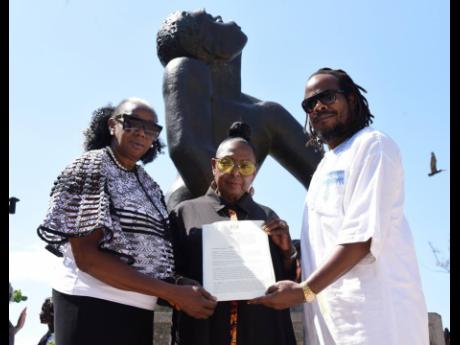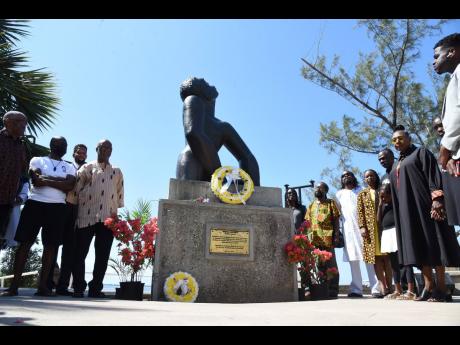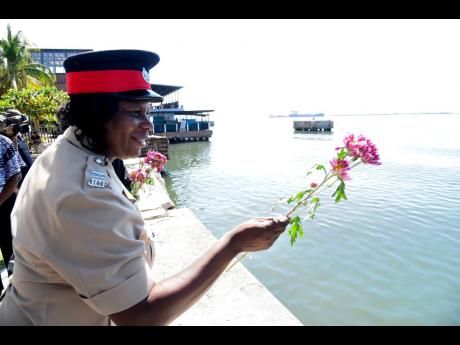‘Legacy of slavery still resonates with J’cans’
There was a rallying call for reparations on Saturday as Culture Minister Olivia Grange and members of the National Council on Reparation (NCR) marked the United Nations-declared International Day for Remembering Victims of Slavery and the Slave Trade in Kingston.
The day – March 25 – provided the world with an opportunity to pause and reflect on the horrific nature of the transatlantic trade in Africans and their enslavement.
According to some attendees at the local observance at Victoria Pier, economic freedom must be attained through reparations paid by the descendants of former slave masters for Jamaica to be completely free from its colonial past, which was marred by enslavement.
“It’s important to remember our history and what our ancestors fought for from the beginning – physical freedom – [but] what we need now is the final leap through reparation for economic freedom. Our greatest need is economic freedom [as] it will complete our independence,” said Frank Phipps, KC, a former chairman of the Jamaica Labour Party.
This call was echoed by the Reverend Dr Stephen Jennings, past president of the Jamaica Baptist Union and a member of the NRC.
He told The Gleaner that events such as the one held on Saturday were of great significance as “if we don’t remember our past appropriately, then we have not learned the lessons, and, in turn, we will suffer more”.
Jennings stated that the legacy of slavery still resonated with many Jamaicans and continued to affect the country’s economic development, citizens’ social relationships, the country’s political arrangements, and to some extent, people’s spiritual lives.
“Psychologically, for instance, some people are still prone to violence and excessive fear and anxiety because they have a sense of being oppressed and the depression that comes with that,” he said.
At the event, Grange read a proclamation declaring March 25 a National Day for the Remembrance of the Victims of Slavery and the Slave Trade, which was signed by Governor General Sir Patrick Allen.
The culture minister also laid a wreath at the base of the ‘Negro Aroused’ sculpture in memory of Jamaica’s slave ancestors. Flowers were also thrown into the Kingston Harbour in tribute.
“My wife and I thank God that we are privileged to live so long to be a part of this,” said the 93-year-old Phipps, who has been married to his 97-year-old wife, Pearl, for nearly 70 years.
Laleta Davis-Mattis, chairman of the NCR, said that the day was highly symbolic as it would now be inscribed in books for future generations to read about and to be knowledgeable about its observance.
“I believe that commemorating [and] memorialising significant events in our history is very important in the development of this country,” she said.
The majority of enslaved Africans took their first steps on Jamaican soil at Kingston Harbour from the early 1700s to the early 1800s. At least 1,251 trips were made by slavers, who forcefully transported at least 364,000 enslaved Africans.
Historical records demonstrate that the Africans who disembarked at the Kingston Harbour arrived from a multiplicity of West African regions.
Fourteen ships also left from Kingston Harbour to Africa to transport Africans to the Caribbean. Twelve of the vessels returned to the Kingston Harbour and went to Barbados on their return.
“From victim we have become the victors. From a plantation, we have created a nation,” noted cultural expert Sydney Bartley as he moderated the proceedings.



